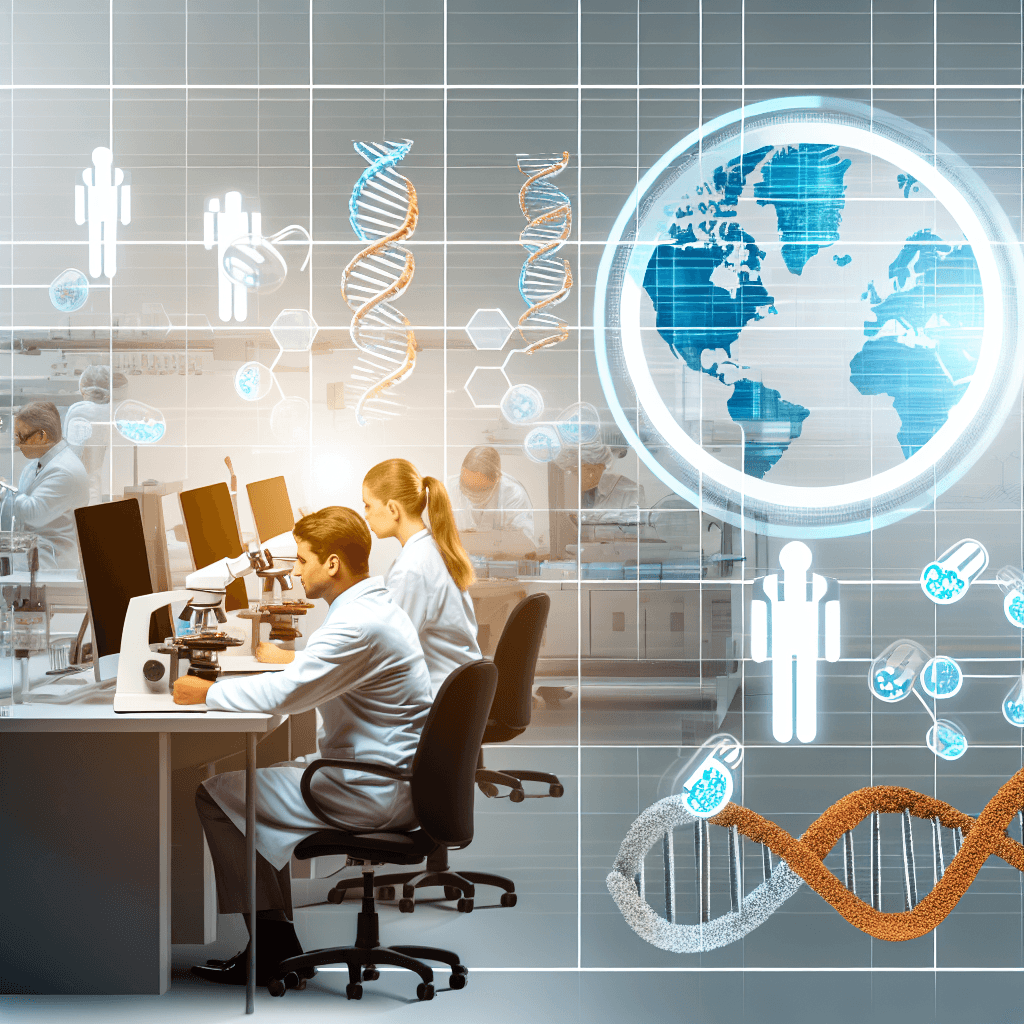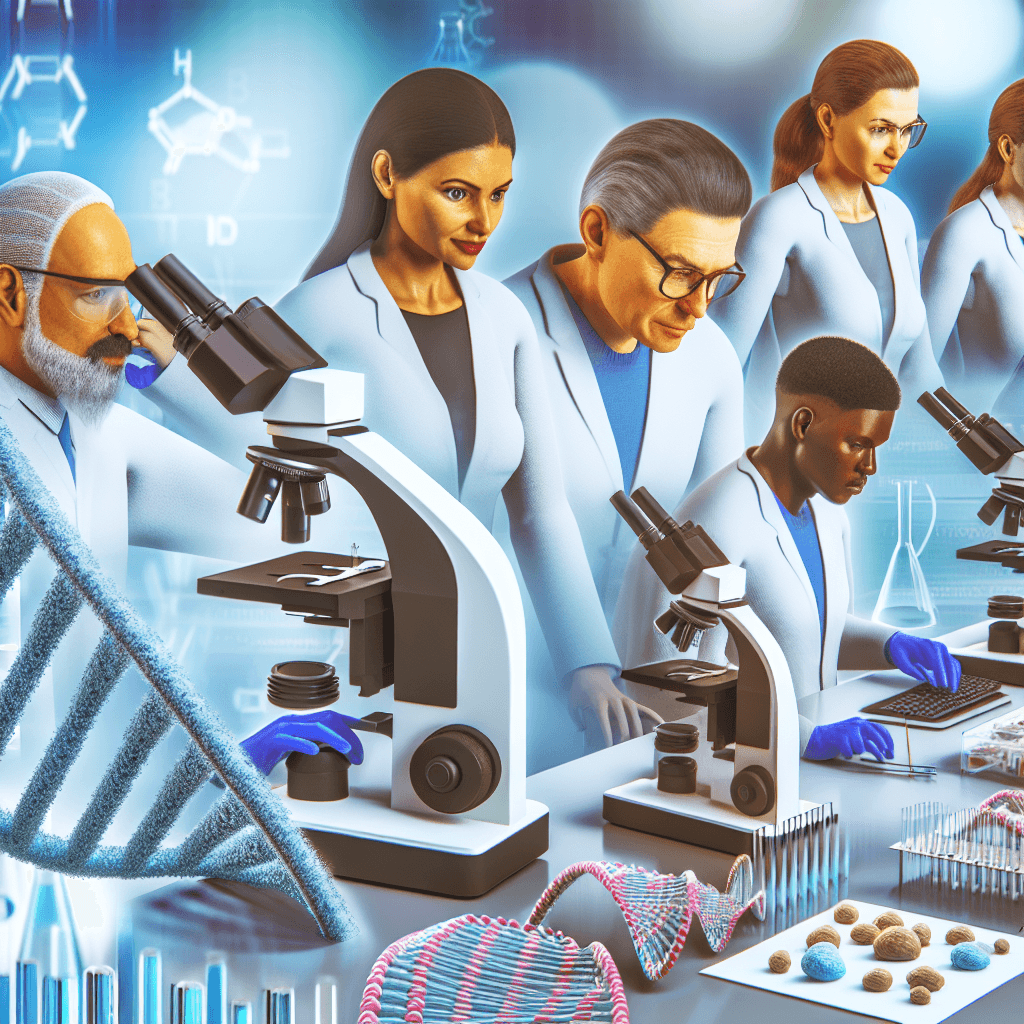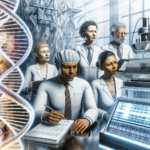Discover how life sciences research is revolutionizing global healthcare and driving innovation for a healthier future. #LifeSciences #HealthcareInnovation
Life Sciences Research Driving Global Healthcare Innovation

Table of Contents
- Introduction
- The Impact of Precision Medicine on Global Healthcare
- Advancements in Gene Editing Technology and its Potential for Treating Diseases
- The Role of Artificial Intelligence in Revolutionizing Drug Discovery and Development
- The Growing Importance of Big Data in Improving Healthcare Outcomes
- Q&A
- Conclusion
“Uncovering the secrets of life to revolutionize healthcare worldwide.”
Introduction
Life sciences research is a crucial aspect of the healthcare industry, driving innovation and advancements that have a global impact. This field encompasses a wide range of scientific disciplines, including biology, genetics, medicine, and technology, all working together to improve human health and well-being. Through extensive research and development, life sciences have led to groundbreaking discoveries and treatments for various diseases and conditions, ultimately shaping the landscape of modern healthcare. In this introduction, we will explore the role of life sciences research in driving global healthcare innovation and its significant impact on society.
The Impact of Precision Medicine on Global Healthcare
The field of precision medicine has been gaining significant attention in the global healthcare industry in recent years. This approach to healthcare focuses on tailoring medical treatments and interventions to the individual characteristics of each patient, including their genetic makeup, lifestyle, and environment. This personalized approach has the potential to revolutionize the way we prevent, diagnose, and treat diseases, ultimately leading to better health outcomes for patients worldwide.
One of the key drivers of precision medicine is the advancements in life sciences research. With the rapid development of technologies such as genomics, proteomics, and bioinformatics, scientists are now able to gather and analyze vast amounts of data about an individual’s genetic profile and molecular makeup. This wealth of information has opened up new possibilities for understanding the underlying causes of diseases and developing targeted treatments.
One of the most significant impacts of precision medicine on global healthcare is in the field of cancer treatment. Cancer is a complex disease, and traditional treatments such as chemotherapy and radiation therapy can have significant side effects and may not be effective for all patients. With precision medicine, doctors can now analyze a patient’s tumor at a molecular level and identify specific genetic mutations that are driving the cancer’s growth. This information allows for the development of targeted therapies that can attack these mutations, leading to more effective and less toxic treatments.
Precision medicine is also making a significant impact in the field of rare diseases. These are conditions that affect a small percentage of the population and often have no known cure. With traditional medicine, it can be challenging to diagnose and treat rare diseases due to their complex and diverse nature. However, with precision medicine, doctors can use genetic testing to identify the underlying cause of the disease and develop personalized treatment plans for each patient. This has given hope to many individuals and families who previously had limited treatment options.
Another area where precision medicine is making a difference is in the prevention of diseases. By analyzing an individual’s genetic predisposition to certain conditions, doctors can identify those at high risk and implement preventive measures. For example, individuals with a family history of heart disease can undergo genetic testing to determine their risk and make lifestyle changes or take medication to reduce their chances of developing the disease. This proactive approach to healthcare has the potential to save lives and reduce healthcare costs in the long run.
The impact of precision medicine is not limited to the treatment and prevention of diseases. It is also driving innovation in the development of new drugs and therapies. With a better understanding of the genetic and molecular mechanisms of diseases, pharmaceutical companies can now develop more targeted and effective treatments. This has led to a shift from the traditional one-size-fits-all approach to drug development to a more personalized approach, resulting in better outcomes for patients.
In addition to its impact on patient care, precision medicine is also driving economic growth in the life sciences industry. The demand for genetic testing, data analysis, and personalized treatments has created new job opportunities and attracted investments in research and development. This has also led to collaborations between academia, government, and the private sector, fostering a culture of innovation and driving progress in the field.
In conclusion, precision medicine is a game-changer in the global healthcare industry, and its impact will only continue to grow in the coming years. With advancements in life sciences research, we are now able to unlock the potential of personalized medicine, leading to better health outcomes for patients worldwide. As we continue to push the boundaries of what is possible, precision medicine will undoubtedly play a crucial role in driving healthcare innovation and improving the lives of individuals around the globe.
Advancements in Gene Editing Technology and its Potential for Treating Diseases

The field of life sciences research has been at the forefront of driving global healthcare innovation. With advancements in technology and a deeper understanding of the human body, scientists and researchers have been able to make significant strides in the treatment and prevention of diseases. One area that has shown immense potential is gene editing technology.
Gene editing technology, also known as genome editing, is a process that allows scientists to make precise changes to an organism’s DNA. This technology has been around for decades, but recent advancements have made it more efficient, accurate, and accessible. The most commonly used gene editing tool is CRISPR-Cas9, which stands for Clustered Regularly Interspaced Short Palindromic Repeats-CRISPR associated protein 9.
The potential of gene editing technology lies in its ability to target and modify specific genes that are responsible for causing diseases. This means that instead of treating the symptoms of a disease, scientists can now target the root cause and potentially cure it. This has opened up a whole new world of possibilities for treating diseases that were previously considered incurable.
One of the most promising applications of gene editing technology is in the treatment of genetic disorders. These are diseases caused by mutations in a person’s DNA, such as cystic fibrosis, sickle cell anemia, and muscular dystrophy. By using gene editing technology, scientists can correct these mutations and potentially cure the disease. This has already been demonstrated in a clinical trial where CRISPR-Cas9 was used to treat a genetic form of blindness.
In addition to treating genetic disorders, gene editing technology also has the potential to revolutionize cancer treatment. Cancer is caused by mutations in a person’s DNA, and traditional treatments such as chemotherapy and radiation therapy can be harsh and have many side effects. With gene editing technology, scientists can target and edit the specific genes responsible for cancer, leading to more effective and targeted treatments with fewer side effects.
Another area where gene editing technology is showing promise is in the field of infectious diseases. By targeting and modifying the genes of viruses and bacteria, scientists can potentially make them less harmful or even eliminate them altogether. This could have a significant impact on global health, especially in developing countries where infectious diseases are a major cause of death.
Apart from its potential for treating diseases, gene editing technology is also being used in research to better understand the human body and its functions. By creating animal models with specific genetic mutations, scientists can study the effects of these mutations and gain a deeper understanding of how they contribute to diseases. This knowledge can then be used to develop more effective treatments.
However, with all its potential, gene editing technology also raises ethical concerns. The ability to modify human DNA raises questions about the boundaries of what is considered acceptable and the potential consequences of altering the human genome. There are ongoing debates and discussions about the ethical implications of gene editing technology, and it is crucial for scientists and policymakers to carefully consider these issues.
In conclusion, advancements in gene editing technology have opened up a world of possibilities for treating and preventing diseases. From genetic disorders to cancer and infectious diseases, this technology has the potential to revolutionize healthcare and improve the lives of millions of people worldwide. However, it is essential to proceed with caution and carefully consider the ethical implications to ensure that this technology is used for the betterment of humanity. As research in this field continues, we can only hope for more breakthroughs and advancements that will drive global healthcare innovation forward.
The Role of Artificial Intelligence in Revolutionizing Drug Discovery and Development
The field of life sciences research has been at the forefront of driving global healthcare innovation. With advancements in technology and a deeper understanding of biological processes, scientists and researchers have been able to develop new treatments and cures for various diseases. One of the most promising areas of innovation in life sciences research is the use of artificial intelligence (AI) in drug discovery and development.
AI, also known as machine learning, is a branch of computer science that focuses on creating intelligent machines that can learn and make decisions on their own. In the context of drug discovery and development, AI algorithms are used to analyze vast amounts of data and identify patterns that can lead to the discovery of new drugs or repurposing of existing ones.
One of the main advantages of using AI in drug discovery is its ability to process and analyze large datasets at a much faster rate than humans. This is crucial in a field where the traditional drug discovery process can take years and cost millions of dollars. With AI, researchers can sift through massive amounts of data in a matter of hours, significantly reducing the time and cost of drug development.
Moreover, AI algorithms can identify patterns and relationships in data that may not be apparent to human researchers. This can lead to the discovery of new drug targets or the repurposing of existing drugs for different diseases. For example, a drug that was originally developed to treat one type of cancer may be found to be effective in treating a completely different type of cancer, thanks to AI analysis.
Another area where AI is making a significant impact is in the design of clinical trials. Traditionally, clinical trials are designed based on the knowledge and experience of researchers, which can be limited and biased. With AI, researchers can use data from previous trials and real-world patient data to design more efficient and effective clinical trials. This not only speeds up the drug development process but also reduces the risk of failure in later stages.
In addition to drug discovery and clinical trial design, AI is also being used in drug repurposing. This is the process of finding new uses for existing drugs. With the help of AI, researchers can analyze data from clinical trials, electronic health records, and other sources to identify potential new uses for drugs that have already been approved by regulatory agencies. This not only saves time and resources but also provides patients with access to new treatments that may have otherwise gone undiscovered.
Furthermore, AI is also being used to improve the accuracy and efficiency of drug safety testing. Traditional methods of drug safety testing involve animal testing, which can be time-consuming, expensive, and ethically controversial. With AI, researchers can use computer simulations and predictive models to assess the safety of drugs, reducing the need for animal testing.
The use of AI in drug discovery and development is not without its challenges. One of the main concerns is the lack of transparency in AI algorithms. As these algorithms become more complex, it can be challenging to understand how they arrive at their conclusions. This can be a significant issue when it comes to regulatory approval of new drugs. To address this, researchers are working on developing explainable AI, which would provide a clear understanding of how the algorithm makes decisions.
In conclusion, the use of AI in drug discovery and development is revolutionizing the field of life sciences research. With its ability to analyze vast amounts of data, identify patterns, and improve the efficiency of clinical trials, AI is helping researchers develop new treatments and cures for diseases at a faster rate than ever before. As technology continues to advance, we can expect to see even more significant breakthroughs in healthcare thanks to the integration of AI in life sciences research.
The Growing Importance of Big Data in Improving Healthcare Outcomes
The field of life sciences research has been at the forefront of driving global healthcare innovation. With advancements in technology and an ever-growing understanding of the human body, researchers and scientists are constantly pushing the boundaries to improve healthcare outcomes. One of the key factors contributing to this progress is the use of big data.
Big data refers to the vast amount of information that is generated and collected in various industries, including healthcare. This data includes patient records, medical images, genetic data, and more. With the help of advanced technology and analytical tools, researchers are able to analyze this data and gain valuable insights that can lead to significant improvements in healthcare.
One of the main ways in which big data is being utilized in healthcare is through precision medicine. This approach takes into account an individual’s unique genetic makeup, lifestyle, and environment to tailor treatments and interventions specifically for them. By analyzing large datasets of genetic information, researchers are able to identify patterns and markers that can help predict an individual’s risk for certain diseases and determine the most effective treatment options.
In addition to precision medicine, big data is also being used to improve healthcare outcomes through population health management. This involves analyzing data from large groups of people to identify trends and patterns that can help healthcare providers better understand and address the health needs of a specific population. For example, by analyzing data from a community, researchers can identify common health issues and develop targeted interventions to improve overall health outcomes.
The use of big data in healthcare is not limited to just patient data. It also includes data from clinical trials, drug development, and medical devices. By analyzing data from clinical trials, researchers can identify potential safety concerns and make necessary adjustments before a drug or device is released to the market. This not only ensures the safety of patients but also helps to speed up the development process.
Furthermore, big data is also being used to improve the efficiency and cost-effectiveness of healthcare. By analyzing data on healthcare utilization and costs, researchers can identify areas where resources are being underutilized or wasted. This information can then be used to make informed decisions on how to allocate resources more effectively, ultimately leading to better healthcare outcomes at a lower cost.
However, with the use of big data comes the challenge of managing and protecting sensitive patient information. As more and more data is collected and shared, there is a growing concern for patient privacy and data security. To address this issue, strict regulations and protocols have been put in place to ensure the ethical and responsible use of big data in healthcare.
In addition to ethical considerations, there are also technical challenges that come with the use of big data in healthcare. The sheer volume and complexity of data require advanced technology and analytical tools to effectively manage and analyze it. This requires a significant investment in infrastructure and resources, which can be a barrier for smaller healthcare organizations.
Despite these challenges, the use of big data in healthcare is proving to be a game-changer in improving healthcare outcomes. With the ability to analyze vast amounts of data and gain valuable insights, researchers and healthcare providers are able to make more informed decisions and provide personalized care to patients. As technology continues to advance and more data becomes available, the potential for big data to drive global healthcare innovation is limitless.
Q&A
1. What is the role of life sciences research in driving global healthcare innovation?
Life sciences research plays a crucial role in driving global healthcare innovation by providing the necessary knowledge, tools, and technologies to improve healthcare outcomes. Through research, scientists are able to understand the underlying mechanisms of diseases and develop new treatments, drugs, and medical devices. This leads to advancements in healthcare that can benefit people all over the world.
2. How does life sciences research impact the development of new treatments and drugs?
Life sciences research is essential for the development of new treatments and drugs. Through research, scientists are able to identify potential drug targets and test the effectiveness and safety of new treatments. This research also helps in understanding the mechanisms of diseases and how drugs can be designed to target them. Without life sciences research, the development of new treatments and drugs would not be possible.
3. What are some recent examples of healthcare innovations driven by life sciences research?
There are many recent examples of healthcare innovations driven by life sciences research. Some notable examples include the development of gene therapy for rare diseases, the use of immunotherapy for cancer treatment, and the creation of personalized medicine based on an individual’s genetic makeup. Additionally, advancements in medical technology such as artificial organs, 3D printing of tissues and organs, and telemedicine have also been made possible through life sciences research.
4. How does global collaboration in life sciences research contribute to healthcare innovation?
Global collaboration in life sciences research is crucial for healthcare innovation as it allows for the sharing of knowledge, resources, and expertise. By working together, scientists from different countries can pool their resources and conduct larger and more comprehensive studies. This can lead to faster and more effective advancements in healthcare, as well as the development of treatments and cures for diseases that may affect specific regions or populations. Additionally, global collaboration can also help in addressing global health issues and promoting equitable access to healthcare innovations.
Conclusion
In conclusion, life sciences research plays a crucial role in driving global healthcare innovation. Through advancements in technology and scientific discoveries, life sciences research has led to the development of new treatments, medicines, and medical devices that have greatly improved the quality of healthcare worldwide. This research also helps in understanding and addressing various health issues, leading to better prevention and management of diseases. Furthermore, life sciences research has also contributed to the growth of the healthcare industry, creating new job opportunities and boosting economic growth. As we continue to invest in and prioritize life sciences research, we can expect to see even more groundbreaking innovations that will positively impact global healthcare.








